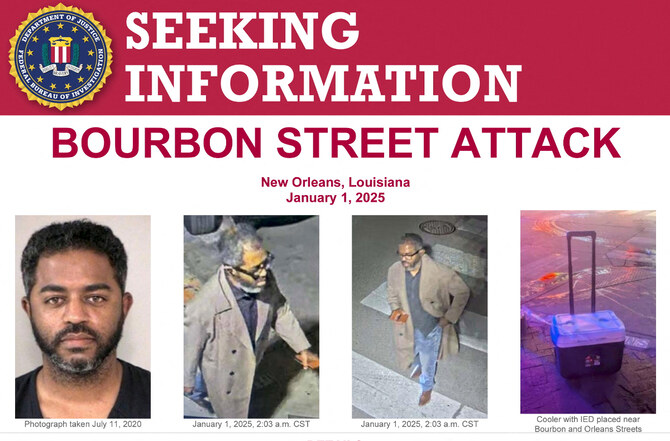WASHINGTON: As investigators learn more about the man who pledged allegiance to the Daesh group, or ISIS, and killed 14 people with a truck on New Year’s Day in New Orleans, a key question remains: How did a veteran and one-time employee of a major corporation become radicalized?
FBI Deputy Assistant Director Christopher Raia said on Thursday that videos made by Shamsud-Din Jabbar just before the attack showed the 42-year-old Texas native supported Daesh, claimed to have joined the militant group before last summer and believed in a “war between the believers and nonbelievers.”
While the FBI was looking into his “path to radicalization,” evidence collected since the attack showed that Jabbar was “100 percent inspired by ISIS,” said Raia.
Jabbar, who authorities said acted alone, was killed in a shootout with police.
His half-brother, Abdur Jabbar, said in an interview that Jabbar, who had worked for audit firm Deloitte, abandoned Islam in his 20s or 30s, but had recently renewed his faith.
Abdur Jabbar told Reuters in Beaumont, Texas, where Jabbar was born and raised, that he had no idea when his half-brother became radicalized.
Ali Soufan, a former FBI agent who investigated terrorism cases and is on an advisory council to Homeland Security Secretary Alejandro Mayorkas, said Jabbar did not fit the typical profile of those radicalized by Daesh.
Jabbar served for 10 years in the US Army and was in his 40s, Soufan noted, explaining that people who fall prey to Daesh recruitment are typically much younger.
“This is a guy who … went from being a patriot to being an Daesh terrorist,” said Soufan.
Attackers responsible for a range of deadly strikes have claimed a link to Daesh and other jihadist groups.
They included the lone survivor of the Islamist squad that killed 130 people across Paris in 2015, the man who killed 49 people at a gay nightclub in Florida in 2016, and the man who drove a truck into a crowded bike path in 2017 in New York City, killing eight people.
Some attacks, like those in 2015 in Paris, were carried out by trained Daesh operatives. But investigators found no evidence of a direct role for the terrorist group in others.
Online recruitment
It is still unclear what contact Jabbar might have had with overseas extremist groups.
US officials and other experts say Daesh conducts most of its recruiting in online chatrooms and over encrypted communications apps since losing the “caliphate” it overran in 2014 in Iraq and Syria to a US-led military coalition. Even as the coalition continues hitting the group’s remaining holdouts, Daesh has stepped up operations in Syria while its Afghanistan- and Africa-based affiliates have kept recruiting, expanding their networks and inspiring attacks.
US officials say Daesh has used the deaths of tens of thousands of Palestinians in Israel’s war in Gaza to boost its recruitment.
Nate Snyder, a former US Department of Homeland Security (DHS) counterterrorism official, said both international and US-based extremist groups follow a similar playbook to draw in new recruits.
The groups use social media to push their message and then move discussions to encrypted app such as Telegram, which could evolve into one-on-one conversations, Snyder said.
“Then people feel like they’re part of a community,” said Snyder, who left DHS in December and joined the race to chair the Democratic National Committee.
Recruits could either receive direct orders or self-radicalize to take action, Snyder said.
Individuals susceptible to recruitment “might have lost their jobs, might have had a mental health crisis, might have just concluded that however hard they’ve tried, they never belong,” said Edmund Fitton-Brown, a former British diplomat who led a UN team that monitors Daesh and Al-Qaeda.
The main appeal of Daesh is its determination to establish a Sunni Muslim “caliphate” ruled by Islamic law, unlike the Taliban, which “has sold out to Afghan nationalism,” or Al-Qaeda, members of which have cooperated with Iran’s Shiite Muslim-run government, he said.
“People that are carrying out those attacks may never in their lives have actually met somebody who is a member of Daesh,” said Fitton-Brown, a senior adviser to the Counter-Extremism Project, a policy and research organization. “But that doesn’t mean they can’t carry out an Daesh-inspired attack.” Crashing cars into crowds or staging stabbing rampages “are unsophisticated, very low-budget attacks (that) are almost impossible to defend against,” he continued. “If you are determined enough to kill unsuspecting public, you are going to be able to do it.”





























